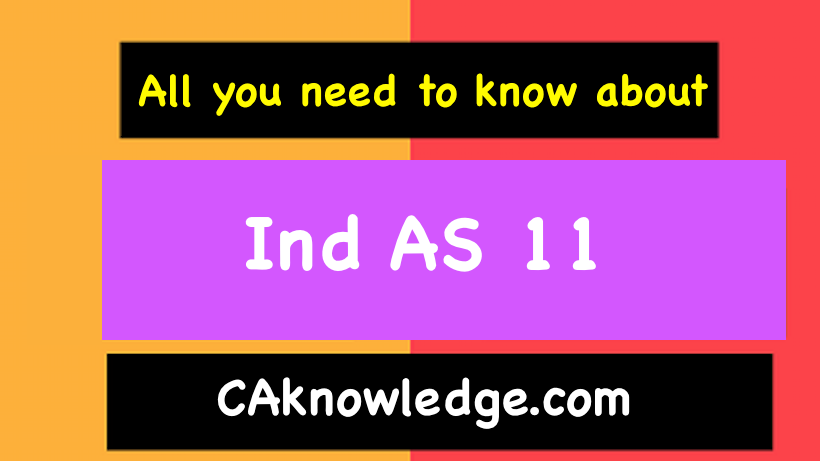Ind AS 11, Construction Contracts: Ind AS 11 prescribes the accounting treatment of revenue and costs associated with construction contracts. Because of the nature of the activity undertaken in construction contracts, the date at which the contract activity is entered into and the date when the activity is completed usually fall into different accounting periods. Therefore, the primary issue in accounting for construction contracts is the allocation of contract revenue and contract costs to the accounting periods in which construction work is performed.
Scope of Ind AS 11
The Standard shall be applied in accounting for construction contracts in the financial statements of contractors. A construction contract is a contract specifically negotiated for the construction of an asset or a combination of assets that are closely interrelated or interdependent in terms of their design, technology and function or their ultimate purpose or use.
The requirements of this Standard are usually applied separately to each construction contract. However, in certain circumstances, it is necessary to apply the Standard to the
separately identifiable components of a single contract or to a group of contracts together in order to reflect th e substance of a contract or a group of contracts.
Advertisement
Contract revenue shall comprise: (a) the initial amount of revenue agreed in the contract; and (b) variations in contract work, claims and incentive
payments: (i) to the extent that it is probable that th ey will result in revenue; and (ii) they are capable of being reliably measured. Contract revenue is measured at the fair value of the consideration received or receivable.
Contract costs shall comprise: (a) costs that relate directly to the specific contract; (b) costs that are attributable to contract activity in general and can be allocated to the contract; and (c) such other costs as are specifically chargeable to the customer under the terms of the contract.
Recognition of contract revenue and expenses
When the outcome of a construction contract can be estimated reliably, contract revenue and contract costs associated with the construction contract shall be recognised as revenue and expenses respectively by reference to the stage of completion of the contract activity at the end of the reporting period.
When the outcome of a construction contract cannot be estimated reliably:
(a) revenue shall be recognised only to the extent of contract costs incurred that it is probable will be recoverable; and (b) contract costs shall be recognised as an expense in the period in which they are incurred
Recognition of expected losses
When it is probable that total contract costs will exceed total contract revenue, the expected loss shall be recognised as an expense immediately.
An entity shall disclose the amount recognised as contract revenue in the period, the method used to determine the contract revenue recognised and stage of completion of contracts in progress.
For the contracts in progress at the end of the period, an entity shall disclose the aggregate costs incurred and recognised profits to date, the amounts of retentions and advances received.
Appendix A of Ind AS 11 gives guidance on accounting by operators for public-to-private service concession arrangements. It sets out principles for recognition and measurement of the obligations and related rights in service concession arrangements. The Appendix prescribes that an operator shall
not recognise the public service infrastructure (within the scope of this appendix) as its Property, Plant and Equipment because the contractual service arrangement does not convey the right to control the use of the infrastructure. It only gives operator the access to operate the infrastructure to provide public service on behalf of the grantor.
The operator shall account for revenue and costs relating to construction or upgrade services in accordance with Ind AS 11 and those relating to operation services in accordance with Ind AS 18. The consideration received or receivable shall be recognised at its fair value. The consideration may be rights to a financial asset or an intangible asset.
The operator recognises a financial asset to the extent that it has a unconditional contractual right to receive cash or another financial asse t from or at the direction of the grantor for the construction services. The operator shall recognise an intangible asset to the extent that it receives a right (a license) to charge users of the public service.
Difference Between Ind AS 11 and AS 7
| AS 7 | Ind AS 11 |
| Contract revenue is measured at consideration received or receivable (without considering the fair value) | Contract Revenue is measured at the fair value of the consideration received or receivable |
| As per AS 7, costs that can be attributed to “Contract Activity in general” and which can be allocated to specific contracts are considered as Contract Costs. Such costs include borrowing costs as per AS 16. | Ind AS 11 does not include borrowing costs as a part of Contract Cost. |
| Does not deal with accounting for Service Concession Arrangements. | Appendix A of Ind AS 11 deals with accounting aspect involved in such arrangements.
Appendix B of Ind AS 11 deals with disclosures of such arrangements. |
Recommended Articles
